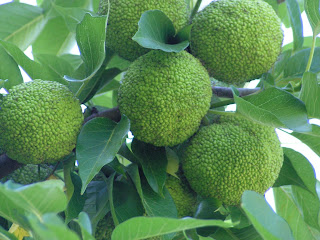Shorn Sheep - Remedies from nature
Information on healing herbs, vitamins, minerals, supplements, and healing with natural things instead of chemicals that only treat the symptom and not the cause. Growing herbs, using native plants, understanding insects, discovering the chemistry of active compounds and the synergy of what we put in our bodies.
Sunday, August 2, 2015
Bluetooth Hollow: Wednesday's Wildflower: Turk's-cap Lily
Bluetooth Hollow: Wednesday's Wildflower: Turk's-cap Lily: There is a magnificent plant blooming in the Blue Ridge mountains of eastern Tennessee. Its name is so wonderfully evocative of its...
Wednesday, July 11, 2012
Hedge apples as cure for Alzheimers?
The fruit from the bois d'arc tree,
commonly known as the Osage Orange tree, contains extraordinary high
levels of isoflavone compounds. Isoflavone compounds may play a role
in lowering one's risk for heart disease and cancer, ease menopause
symptoms and improve bone health. The unique isoflavones from the
Osage Orange has been shown to protect brain cells, or neurons from
the toxic effect of amyloid beta peptide. Amyloid beta peptide is
believe to be responsible for the degeneration of neurons in
Alzheimer's patients. However, the precise mechanisms by which the
isoflavones block the toxicity of amyloid beta peptide are unknown,
according to studies in some laboratories.
Soybeans contain less than one-tenth of
one percent of isoflavone compounds. By comparison, the dry mass of
the Osage Orange hedge balls contain between 5 percent and 10 percent
of isoflavone compounds. No known dietary plant contains this high
level of isoflavone.
Horses often eat the fruit and so do lots of other critters on our land. You can always see piles of half eaten fruits around the entrances to pack rats nests. Squirrels also love to munch on this fruit. The phenolic character of the isoflavones in Osage Orange might cause stomach irritation in humans, though. Salicylic acid, which is also a phenolic compound isolated from willow bark, causes stomach irritation, but this compound led to the discovery of aspirin. The biological activities of the chemical compounds contained in hedge apples are only just now starting to be understood.
The full study from Texas A&M is quoted below. Studies like this are hard to find in general web searches. Pharmaceutical companies don't want people to have easy access to cures that are so easily accessible in anyone's back yard.
If you are looking for hedge balls, you can buy them in our store during their peak times, usually from July to September, but varies due to weather conditions.
The Texas A&M study in it's entirety:
Subscribe to:
Comments (Atom)
